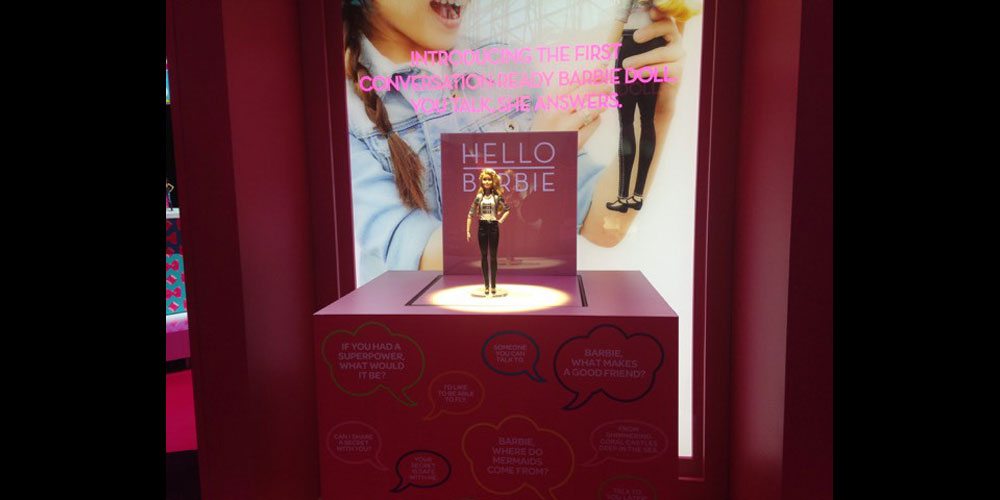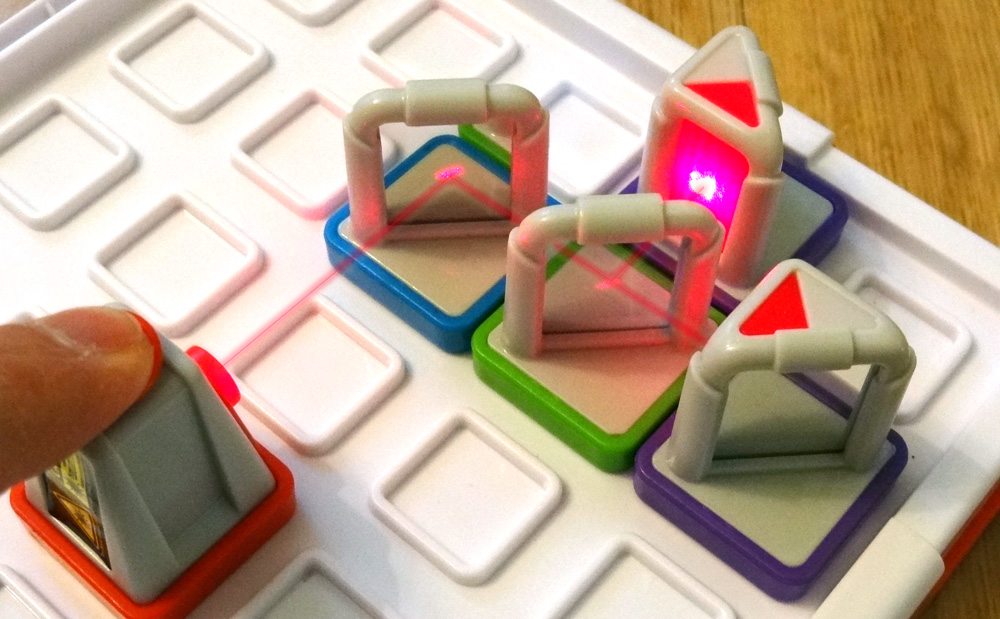Mattel is a big deal at Toy Fair, as you might expect. I had a chance to tour their showroom and see several upcoming products. One of those products is causing a bit of hand-wringing on the net these days. Her name is “Hello Barbie,” and she wants to talk to your children.

The Hello Barbie doll is essentially a “smart doll.” It uses technology created by a company called ToyTalk. Ask Barbie a question, and she’ll answer. More interestingly, she’ll remember what you say. Like Microsoft’s Cortana Personal Assistant, Hello Barbie will keep an online database about you that it learns from. If you’re thinking that’s a bit scary, you’re right. My hand immediately went up “and who has access to this database?” Only the parents, insisted the Mattel rep.
An advocacy group named “Campaign for a Commercial-free Childhood” doesn’t exactly trust Mattel. In a statement released online, they demand (their word, not mine) that Mattel not release the doll, due out in late 2015 (just in time for the holiday rush).
“Kids using ‘Hello Barbie’ aren’t only talking to a doll, they are talking directly to a toy conglomerate whose only interest in them is financial,” said Dr. Susan Linn, CCFC’s Executive Director. “It’s creepy–and creates a host of dangers for children and families.”
I don’t know if I’d go so far to say “creepy,” or use some of the other alarmist language in the release, but it should certainly raise eyebrows, if not red flags. Most adults still aren’t totally aware of how much information Siri, Google Now, and Cortana store on them. To have a child’s toy collecting that same data is concerning. Especially when you throw in this bit of ToyTalk’s legal policy:
We may use, store, process and transcribe Recordings in order to provide and maintain the Service, to perform, test or improve speech recognition technology and artificial intelligence algorithms, or for other research and development and data analysis purposes.
“Data analysis purposes” sounds quite a bit like “marketing.” Mattel insists there’s nothing sinister about this though, and they did it because when they asked focus groups what they wanted from Barbie, the primary response was “to talk with her.”
The thing is, kids talk to their toys all the time. My four year-old had a deep, philosophical discussion with a Flash action figure the other day. Kids have lived eons without a toy that can remember their birthday (“Remember to ask your mommy for some accessories for me!”), their favorite food (“Did you know that Gummy Worms are on sale at Target today?”), or what they want to be when they grow up (“You told me you wanted to be a doctor. Mattel just released a new Hello Doctor Barbie playset. Tell your dad!”).
The above parentheticals are something of a worst-case scenario. The thing is, it’s hard to picture a best-case scenario that involves a company collecting raw statistical data on your children. The fear has almost gone viral, to the point that there’s already a Snopes page devoted to the doll. One wonders if the people freaking out are aware that they’re almost certainly carrying a device in their pockets that tracks their every move. And let’s not even think about all the medical data Apple wants you to let them track via ResearchKit.

“So don’t do that anymore.”
Source: Apple.
But, yes, those are adults. We’ve already sacrificed our privacy, welcoming our new robotic overlords. The question is, should we be acclimating our children to the idea of computers watching and listening?





This is the second such toy to be announced recently (I think the other was a dragon). If you don’t think the NSA will have access to all of this, you’re a hopeless optimist. How better to root out domestic terrorism?
Way, way back in the 1970s, there was an ice cream parlor chain in California called Farrell’s; one of the things they did by way of marketing was a “Birthday Club.” Kids filled out postcards and dropped them in the box on the counter, and then on their birthday, they got a coupon in the mail for a free ice cream.
Some children quickly figured out that if they submitted a dozen cards with different names and birthdays, they would get a free ice cream every month. Two brothers in Palo Alto took advantage of this, submitting several cards with fake names, ranging from Mickey Mouse to real-sounding made-up names such as Johnny Klomberg.
Life goes on, and one day about 8 years later, the boy’s dad is surprised to find that the United States Selective Service Administration has sent a draft notice to a Johnny Klomberg at his address. The only place this name and address had ever been used together was Farrell’s Ice Cream Parlor.
Are we sure we want our kids talking directly to a corporation, given that many of them see their harvested data as an exploitable asset?
https://news.google.com/newspapers?nid=2519&dat=19840802&id=e4ZiAAAAIBAJ&sjid=nXcNAAAAIBAJ&pg=4596,361628&hl=en
Thank You! My next blog post was actually going to be on this topic. I work in data and have a pretty laid back approach to data aggregation. What can be done with data is nothing short of amazing in both the light and dark sides. I freely give consent for programs to collect my data and tailor their services to me. This, on the other hand, toes a number of lines I am not comfortable with being breached. Mattel has essentially created a toy that turns children who are not old enough to consent into market research subjects without compensation. “Hello” Barbie will also be storing children’s personal details, thoughts, and feeling in the cloud where is is vulnerable to the same security breaches that companies like Target and Sony have faced.
I am definitely not an alarmist or a conspiracy theorist. I post pictures of my child on my blog and Facebook. I could easily be tracked down by the information I share online, but I have made a conscious effort not to share information that could embarrass or harm my son in the future. While I believe the chance that this data could be easily searchable by future romantic interests, teachers, or bosses, is very small I am certain I don’t want to teach my son that it is all right to share everything, good and bad, with a data collection service, whether it be through a toy or a keyboard.
Damn this isn’t good at all. I hope they don’t release it.